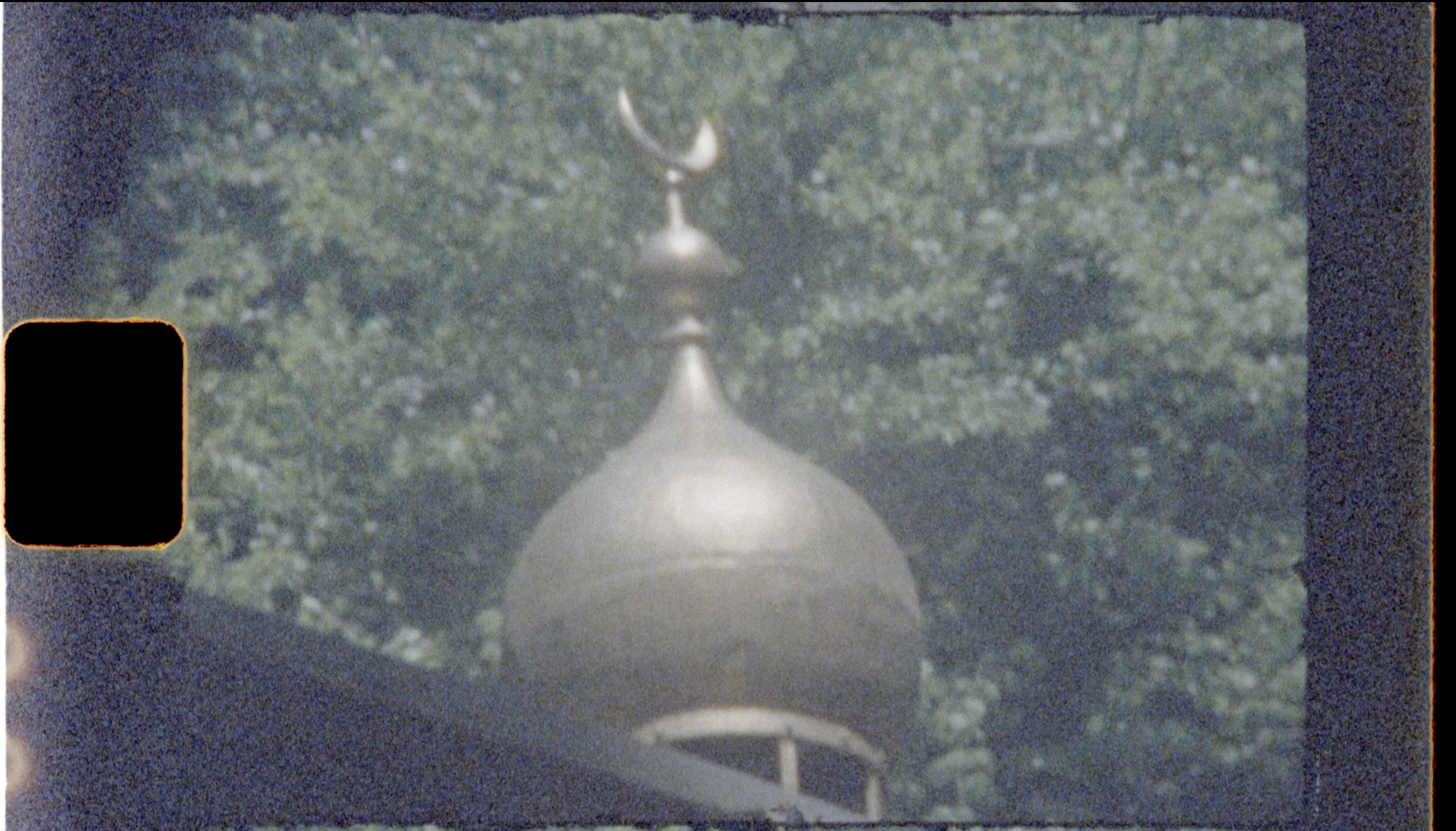



Documentary
Loop - 35mm
presented at ART MUC 2018
a production by HFF Munich
2018
with
HODA STEFANOS
MARIAM SAMI
LAILA NICHOLAS
credits
Director: RABELLE ERIAN
Music: NIKOLAUS GRAF
Artistic assistance:FELIZITAS HOFFMANN & NINA MOOG
Loop - 35mm
presented at ART MUC 2018
a production by HFF Munich
2018
with
HODA STEFANOS
MARIAM SAMI
LAILA NICHOLAS
credits
Director: RABELLE ERIAN
Music: NIKOLAUS GRAF
Artistic assistance:FELIZITAS HOFFMANN & NINA MOOG
ARABESQUE FOR KING LUDWIG II
This project examines eastern architecture of the 19th and 20th century in Europe. The colorful escapade was shot on different film material at several landmarks in Bavaria. The portrayed monuments were all built by King Ludwig II and all have something in common: they are considered to be “oriental”.
This project examines eastern architecture of the 19th and 20th century in Europe. The colorful escapade was shot on different film material at several landmarks in Bavaria. The portrayed monuments were all built by King Ludwig II and all have something in common: they are considered to be “oriental”.
Rabelle Ramez Erian is a director, editor, and producer whose practice explores a range of cultural and socio-political themes, such as immigration, urban development and connecting communities. Working with different international partners, she mainly creates and produces creative documentaries that showcase character-driven stories. In addition to her film practice, Rabelle is proficient in translating Arabic, German and English content. She also initiates and realizes inter-cultural projects, exhibitions, plays and art performances.
Rabelle was born and raised in Cairo, Egypt and moved to Munich, Germany in 2010 to study Art and Multimedia at the Ludwig Maximilian University. After obtaining her Bachelor of Arts degree, she enrolled at the University of Television and Film in Munich to study filmmaking. She currently holds a German Diploma in documentary film directing and journalism for television, which is equivalent to a Master of Science. During her studies, she was awarded a scholarship by the Petra Matusche Foundation for outstanding non-EU students. She has directed, assisted, and edited several documentaries, as well as fictional films. Since 2015, her work has been screened at several international film festivals, for example, Loikka Dance Film Festival in Helsinki, Dok.fest in Munich, and Festival dei Popoli in Florence.
Taking the initiative to spread awareness about the topic of colonial artifacts in Europe and their restitution, she co-created the ongoing project between Egypt and Switzerland “Return Shepen-Isis” alongside film and theater director Milo Rau and Egyptologist Dr. Monica Hanna. In addition, she was the dramaturg of the interdisciplinary project “BLACK LAND” (2022) in cooperation with Elena Sinanina and the Egyptian Museum in Berlin.
In 2021, Rabelle worked as a dramaturg assistant at the Maxim Gorki Theater. As a digital producer, Rabelle worked with Ong Keng Sen at the 5th Berliner Herbstsalon to execute the “Young Curators Academy”. In 2018, she worked with the Open Border Ensemble at the State Theater “Münchner Kammerspiele”. Her first project as a translator and interpreter was a trilingual production called “What they want to hear” by Lola Arias. Later on, she joined the creative team in productions by Rene Pollesh and Toshiki Okada.
Rabelle's interest in art also includes curating exhibitions. For example, in 2017, she assisted in the programming of the international film festival UNDERDOX and co-curated the accompanying video biennale VIDEODOX, an exposition for video art from Bavaria.
From 2011 to 2014, Rabelle taught visual arts for children and young adults at Kunstwerk-Haidhausen, a private art school, as well as at SchlaU Schule, a center for young refugees in Munich. Following her passion for education, she also conducted filmmaking workshops for children at the Museum Brandhorst and the Kreisjugendring, a youth center organized by the local district in Munich.
Rabelle was born and raised in Cairo, Egypt and moved to Munich, Germany in 2010 to study Art and Multimedia at the Ludwig Maximilian University. After obtaining her Bachelor of Arts degree, she enrolled at the University of Television and Film in Munich to study filmmaking. She currently holds a German Diploma in documentary film directing and journalism for television, which is equivalent to a Master of Science. During her studies, she was awarded a scholarship by the Petra Matusche Foundation for outstanding non-EU students. She has directed, assisted, and edited several documentaries, as well as fictional films. Since 2015, her work has been screened at several international film festivals, for example, Loikka Dance Film Festival in Helsinki, Dok.fest in Munich, and Festival dei Popoli in Florence.
Taking the initiative to spread awareness about the topic of colonial artifacts in Europe and their restitution, she co-created the ongoing project between Egypt and Switzerland “Return Shepen-Isis” alongside film and theater director Milo Rau and Egyptologist Dr. Monica Hanna. In addition, she was the dramaturg of the interdisciplinary project “BLACK LAND” (2022) in cooperation with Elena Sinanina and the Egyptian Museum in Berlin.
In 2021, Rabelle worked as a dramaturg assistant at the Maxim Gorki Theater. As a digital producer, Rabelle worked with Ong Keng Sen at the 5th Berliner Herbstsalon to execute the “Young Curators Academy”. In 2018, she worked with the Open Border Ensemble at the State Theater “Münchner Kammerspiele”. Her first project as a translator and interpreter was a trilingual production called “What they want to hear” by Lola Arias. Later on, she joined the creative team in productions by Rene Pollesh and Toshiki Okada.
Rabelle's interest in art also includes curating exhibitions. For example, in 2017, she assisted in the programming of the international film festival UNDERDOX and co-curated the accompanying video biennale VIDEODOX, an exposition for video art from Bavaria.
From 2011 to 2014, Rabelle taught visual arts for children and young adults at Kunstwerk-Haidhausen, a private art school, as well as at SchlaU Schule, a center for young refugees in Munich. Following her passion for education, she also conducted filmmaking workshops for children at the Museum Brandhorst and the Kreisjugendring, a youth center organized by the local district in Munich.